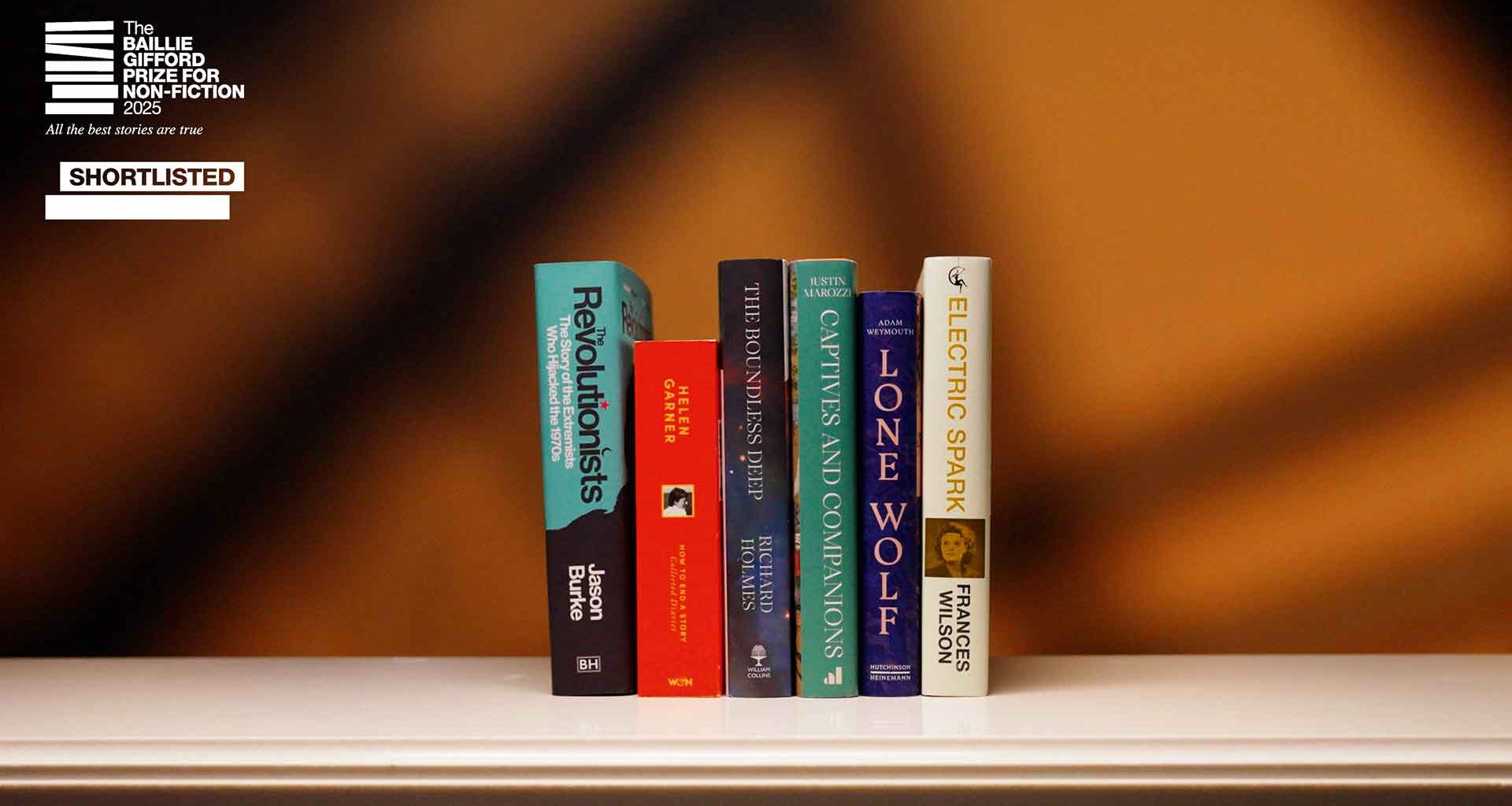Jason Burke, Helen Garner, Richard Holmes, Justin Marozzi, Adam Weymouth and Frances Wilson have been shortlisted for the Baillie Gifford Prize for Non-Fiction 2025, worth £50,000.
The prize recognises and rewards the best of non-fiction and is open to authors of any nationality. It covers all non-fiction in the areas of current affairs, history, politics, science, sport, travel, biography, autobiography and the arts. The winning author will receive £50,000, with the other shortlisted authors receiving £5,000, bringing the total prize value to £75,000.
Two authors are recognised by the prize for a third time: Holmes (shortlisted in 1999 and 2009) and Wilson (longlisted in 2016 and 2021).
The titles on this year’s shortlist are:
The Revolutionists: The Story of the Extremists Who Hijacked the 1970s (The Bodley Head, Vintage) by Jason Burke (British)
How to End a Story: Collected Diaries (Weidenfeld & Nicolson) by Helen Garner (Australian)
The Boundless Deep: Young Tennyson, Science and the Crisis of Belief (WilliamCollins) by Richard Holmes (British)
Captives and Companions: A History of Slavery and the Slave Trade in the Islamic World (Allen Lane) by Justin Marozzi (British)
Lone Wolf: Walking the Faultlines of Europe (Hutchinson Heinemann) by Adam Weymouth (British)
Electric Spark: The Enigma of Muriel Spark (Bloomsbury Circus) by Frances Wilson (British)
The six books were chosen by literary editor of the Times and the Sunday Times Robbie Millen (chair), historian and author Pratinav Anil, journalist and broadcaster Inaya Folarin Iman, previous prize-winner Lucy Hughes-Hallett along with deputy culture editor of the Economist Rachel Lloyd and writer Peter Parker.
Their selection was made from over 350 books published between 1st November 2024 and 31st October 2025.
Millen said: “Formidable female novelists, ghastly literary men, a faith-shaken poet, eunuchs, pirates, horny wolves, international terrorists. This is who the judges have been spending time with. And what good company. The six books on this year’s shortlist have real breadth in terms of subject matter and style. We have been delighted by the candour and courage displayed by the sextet, by the wit and scintillating prose, by their confidence and impressive command of their subjects. It’s a shortlist that will be bold company in the darkening autumn evenings.”
Continues…
The judges said of Burke’s exploration of extremism in the 1970s: “The Revolutionists makes a counter-intuitive argument – tracing the decline of the left that led to the rise of Islamism – and is tremendously well-written. It is the work of a lifetime, drawing on 12 languages for its services and is the kind of book this year’s judges would like to champion.”
Garner’s collected diaries won the following praise from judges: “Garner’s candid, pacy diary chronicles the end of her second marriage and the challenges of being a writer. There is a skilled narrative drive which presents a lot of personal material that keeps you hooked, not necessarily on what is happening in terms of the story, but about Garner’s whole life and about what’s going on outside her window.”
Meanwhile the panel said of Holmes’ take on Tennyson, The Boundless Deep: “Richard Holmes is a master biographer and this thrilling book, which focuses on the poet’s early years and his immersion in scientific thought, has the effect of reintroducing us to Tennyson. It situates his poetry within the much wider intellectual context of his time, exploring existential questions and the terrifying implications of scientific discovery on our understanding of the human condition.”
Marozzi’s entry, Captives and Companions, explores slavery in the Muslim world and “is tremendously well written,” the judges said. “It’s very mannered, it’s thoroughly investigated, and it’s all put together very well.”
Weymouth’s Lone Wolf: Walking the Faultlines of Europe follows the journey of a single wolf from Slovenia, across the Alps into Italy.
The panel said: “We learn a lot about how we see wolves in popular culture, and it discusses big issues like conservation and rewilding. There’s a great cast of characters – it’s a beautiful book that covers so much.”
Finally the panel said of Electric Spark: “Wilson’s biography of Muriel Spark is a dazzling exploration of the novelist’s mind and character. Wilson does a very good job of inhabiting Spark, revealing new light on her use of codes and word play for example. It’s completely fascinating and like all good, literary biographies, it makes you want to go back and reread her entire works.”
The Bookseller understands from the shortlist press conference on Wednesday (1st October) that Baillie Gifford has not yet confirmed whether they will be sponsoring the prize next year.
The winner will be announced on 4th November at an award ceremony supported by the Blavatnik Family Foundation. The announcement will also be livestreamed across the Baillie Gifford Prize for Non-Fiction social channels. The shortlisted authors will be interviewed on The Baillie Gifford Prize Read Smart podcast.
Last year’s winner was Richard Flanagan for Question 7 (Chatto & Windus), the first writer to win both this prize and the Booker.

